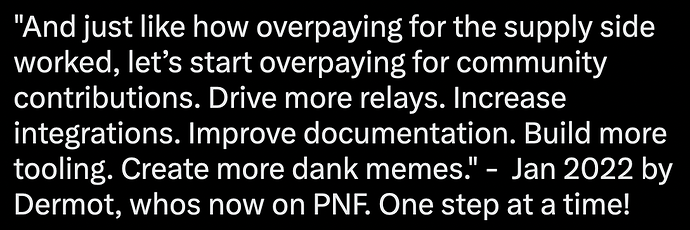One of the friction points in contributions to the DAO has been the lack of suggested structure for how contributors are compensated. There have been some functional practices, but not terribly well defined, and we’ve seen proposals take on a number of forms. Currently, we have two forms that actually work well:
Reimbursement
A team performs work, submits a request for reimbursement, and it is evaluated by the DAO and voted to approve or reject. If rejected, the team may resubmit, incorporating feedback that came with the rejection.
Bounties
The DAO/Foundation approve a budget for a line of bounties with a clear deliverable and guardrails, and accepted contributions to the bounties are paid out according to the reward set.
There have also been a couple of proposals along the way which have been rejected or viewed negatively, partially because of the structure of compensation requested. This includes having the Foundation stake nodes for the proposer, or a “salary” type structure with work being broadly defined without specific deliverables (economics analysis, design work).
And, we’ve had short term small cap service proposals like Reddit marketing or translation services which stride the line between the two.
I would like to open a conversation here about reducing that friction with some standardized guidelines around the following:
-
Appraising work performed, both in reimbursement for past work, and in assessment of estimating future work (building on @shane 's value model). This also needs to account for regional cost of living variances, as work performed in Los Angeles is far more expensive than work performed in Bangalore, for example.
-
Determine a standard term for forward looking work (@TheDoc 's 3 month term seems to have been palatable to the DAO), and standard practices for evaluating the work performed during that term (there is potentially some specific expertise needed to evaluate the quality of work performed, and the impact on the protocol/DAO/community at large depending on the work performed).
-
Streamline the creation of new bounties with clear deliverables for recurring service providers with discrete offerings (economics, translation, design, development, etc.). Given what we’ve seen with content and development bounties, this seems to be the most frictionless way to get specific contributions accomplished, and comes with the flexibility to adjust bounty rewards as needed.
@JackALaing 's PEP-16 proposal a little over a year ago was a step in this direction, but never moved forward due to its reliance on Coordinapes, but now that we have Dework, I think it bears further conversation.
I would love to this conversation result in a published set of guidelines (perhaps with some snazzy editing and graphics from @zaatar , @Cryptocorn , and @Ale_dVG ) so that new contributors to the system have some sense of how to quickly and easily participate, and so that existing contributors aren’t tasked with the high friction job of trying to determine an economic structure without guardrails.
